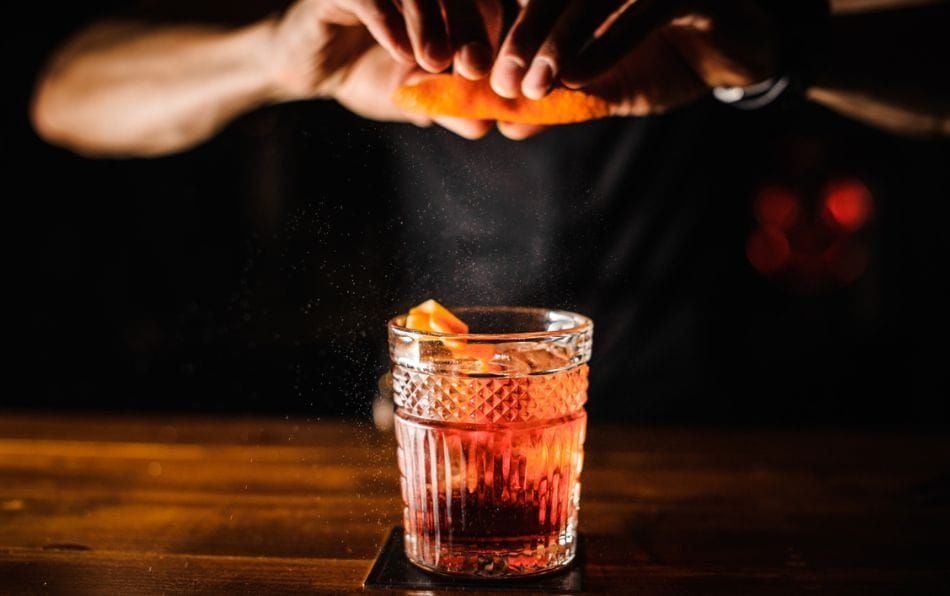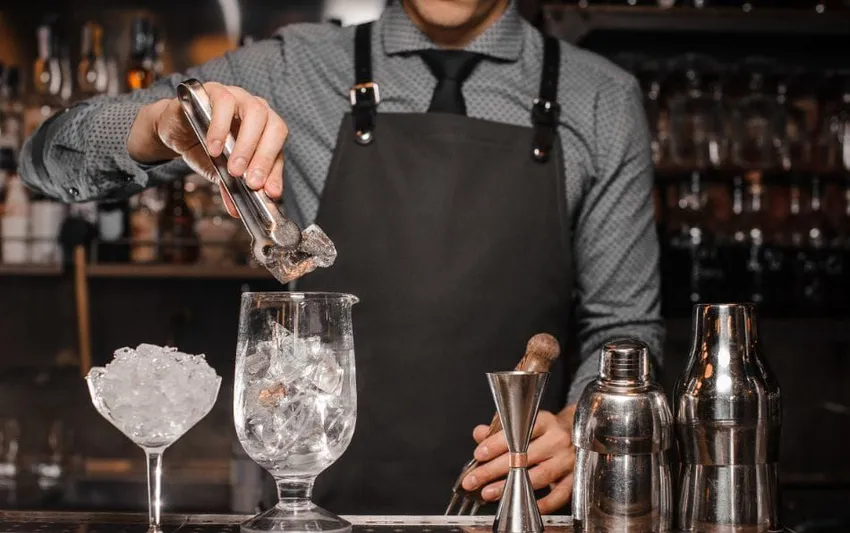Being a good Bartender means you're always on the lookout for ways to improve your skills behind the bar. Whether you're just starting out or you've been in the industry for years, mastering the game can help you stand out in this competitive field.
To help you do this, we've compiled five essential tips on how to be a good Bartender.
1. Know Your Cocktails
Everyone knows that a Bartender's primary responsibility is to mix drinks and serve them. So, a solid understanding of different types of cocktails is critical.
Familiarize Yourself with Popular Cocktails
If you want to be a Bartender, you need to know how to make all the popular cocktails - simple as that. Start by learning the recipes of classic cocktails, the techniques for making them and their history.
When a customer orders something, you want to be able to prepare the drink without having them reference the ingredients. If you can provide a quick fun fact about the cocktail to give a bit of insider knowledge while preparing it, even better.
Some of the commonly ordered cocktails to start with include:
- Margarita
- Mojito
- Pina colada
- Cosmopolitan
- Espresso Martini
- Sex on the beach
- Classic Negroni
The good news is that learning more about these combinations doesn't have to be expensive. You can enroll in a free online Bartending course and learn all the basics without spending a dime. For more formal education, consider enrolling in a bartending school.
Understanding the basics of classic cocktails can also serve as a great foundation for creating new drinks. The more you learn about mixing techniques and flavor combinations, the better your unique creations are going to be.
While knowing the classics is key, staying on top of new trends and seasonal drinks can really make you stand out. As a Bartender, you want to experiment with fresh ingredients and different flavor profiles to craft something unique. It’s also helpful to have solid knowledge of wine and spirits – being able to recommend pairings or explain flavor notes adds to the overall experience and makes you a go-to expert behind the bar.
Knowing Different Types of Liquor
Being a Bartender means you should know your liquors. This entails learning more about different types, from vodkas and gins to whiskeys and tequilas.
If you enjoy trying alcoholic drinks, this should be easy. Now, you'll just have to research their origins, flavor profiles and ideal mixing partners.
Any knowledge you obtain will help you do better at your job. You'll be able to make better recommendations and respond to any questions your customers may have.
2. Arrange Your Workstation Setup Properly
When working as a Bartender, the bar area is your stage. Perfecting your workstation helps improve your performance and efficiency. If the tools you use every day are organized and easily accessible, you'll never waste time searching for items.
A tidy and efficient bar area doesn't only improve workflow, it also reflects professionalism. Having everything arranged properly will impact the customer's perception of the bar and its staff.
Organize Your Bar Tools and Ingredients
From shakers to strainers, Bartenders use all kinds of bar tools and ingredients when mixing drinks. If you fail to organize those, it may impact your workflow.
Place everything you use on a regular basis - like your mixing glass - in prominent spots and somewhere you can access easily. This ensures you can grab anything you need without interrupting your rhythm.
Use trays and bar caddies to store small things like jiggers and strainers and make them easy to find. Organizing your equipment in such ways would also help maintain a clean and organized workstation.
Also, keep all of your mixers well-stocked and organized. This can make it much easier to find exactly what you need when preparing a drink and ensure you serve it in a timely fashion.
Grouping all ingredients in a logical order can speed up the process and even improve the overall aesthetic of your workstation.
Maintain a Clean and Efficient Work Environment
Keeping the bar area clean and tidy can help create a better work environment and increase customer satisfaction.
Clean and polish your glassware regularly and make sure it's free of blemishes and smudges. The same goes for the bar top, shelves and your equipment. Keep them spotless and well-organized, and it'll add to the visual appeal of your workstation.
Additionally, always check small things such as napkins, straws and garnishes and make sure you're fully stocked.
A clean and organized bar isn’t just for looks – it’s essential for efficiency and professionalism. Regularly sanitizing surfaces, storing perishable ingredients properly, and keeping glassware spotless shows attention to detail. Customers notice these things, and a clean station helps you stay on top of your game during peak hours. A tidy bar is a reflection of the care you put into your craft.
Elevate Your Customer Service Game
Great Bartenders don’t just serve drinks – they serve experiences. Taking the time to engage with customers, remember their favorites, and create a welcoming vibe can turn a good night into a great one. Strong communication and people skills – like listening, reading the room, and staying calm under pressure – can set you apart.
Even during the busiest shifts, a friendly and positive approach keeps customers coming back. After all, everyone loves a Bartender who knows how to make them feel special.
3. Develop Mixology Skills
A Bartender and Mixologist are two different roles but it doesn't hurt when a Bartender can come up with drink recipes of their own.
Embrace Your Inner Mixologist
Even if you work as a Bartender and not as a Mixologist, you can benefit from taking a mixology course and learning how to create new and unique drinks.
Aside from taking mixology classes, you can read mixology publications and experiment with different flavors. Mixing new cocktails is fun and can be quite rewarding.
Once you believe your mixology ability is at a decent level, you can start creating new drinks to serve at your bar.
Create a Signature Cocktail
Ask any successful Bartender and they'll tell you they've developed a cocktail of their own at some point. Doing the same can help open up new Bartender job opportunities and potentially attract customers to the bar where you work.
Experiment with different ingredients and think of your personal preferences in order to come up with your signature cocktail. This drink will showcase your creativity and bartending skills.
Do it right and you'll give customers a reason to remember your bar and visit it again. Your signature cocktail can also be a great conversation starter and help you leave lasting impressions.

Master Responsible Alcohol Service
Knowing how to mix a perfect drink is important – but so is knowing when not to serve one. A great bartender understands local alcohol laws, can spot fake IDs, and knows when someone’s had enough. Certifications like TIPS (Training for Intervention Procedures) are a big plus and can teach you how to handle tricky situations with confidence. Being responsible not only keeps everyone safe but also builds trust with your customers and employer.
4. Upsell Effectively and Understand Profitability
Upselling is another important skill for Bartenders. As a Bartender, you should always look for ways to help the establishment increase its profitability. If you do this successfully, it can significantly impact your career.
Recommend Premium Spirits and Mixers
Learn how to recommend premium drinks and highlight their superior quality and unique flavors. Of course, to do this effectively, you first need to learn more about these drinks.
Once you're knowledgeable about different liquor types, don't hesitate to suggest upgrades to your customers' orders.
Upselling not only helps increase the bar's profitability but can also improve customers' overall experience.
Calculate Profit Margins and Identify High-Profit Items
When working as a Bartender, learning more about the financial aspect of the work can seriously contribute to the bar's success.
It's important to learn the profit margins for different cocktails and identify high-profit combinations. Once you do that, you'll know what drinks to recommend when looking to maximize the revenue.
5. Stay Ahead of Industry Trends and Participate in Competitions
Like in many other fields, there's always something new going on in the bartending industry. Staying on top of the most recent trends can significantly boost your career. That way, you'll be aware of new bartending techniques and shifts in customer preferences.
Keeping Up with New Spirits and Cocktails
New liquor and cocktail trends are emerging every day. Being a good Bartender means you never stop learning and you try hard to stay updated on what's popular.
Luckily, there are so many ways to do this. You can read online publications, join groups on social media and attend local trend shows.
Once you learn what's hot, you can experiment with on-trend ingredients and techniques to keep your offerings innovative.
Benefits of Competing and Networking
One of the pros of being a Bartender is that the job makes it easy to maintain a healthy social life. Not only do you talk to customers on a daily basis but there are also plenty of bartending events to attend.
Participating in local bartending competitions can enhance your skills and build your reputation. Stay up to date with all local events and participate whenever you can. Whether it's a mixology or flair bartending competition, gaining extra experience can help you grow your career. Do this often and you'll see yourself coming up with better unique drinks and offering better overall service.
Plus, you'll meet other Bartenders and expand your network. This can open up new job opportunities and help your career progress.
How To Be a Good Bartender: Summary
Being a good Bartender takes a combination of knowledge, skill and professionalism. It's also a type of job in which you never stop learning. Keep researching cocktails and always look for new recipes.
Also remember that being a Bartender isn't all about drinks, it's also about creating a pleasant and lively atmosphere for everyone at the establishment.










Loading comments...